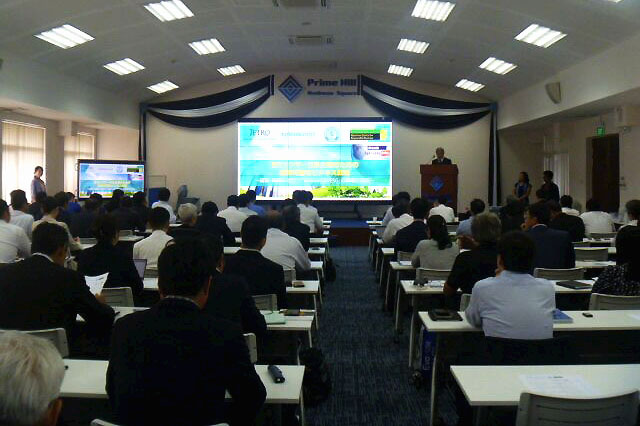MCRB co-hosts seminar on Understanding SDGs/CSR/ESG for Japanese companies

On 26 June, JETRO Yangon (Japan External Trade Organization), Nippon Koei, and MCRB jointly hosted a half-day seminar in Yangon for Japanese companies operating in Myanmar to enhance understanding of responsible business conduct in the Myanmar context.
Approximately 80 participants attended the Japanese language seminar including Japanese multinational enterprises and SMEs from sectors including manufacturing, trading, finance, law firms, services, media, construction, social enterprise, tourism, as well as government institution such as the Directorate of Investment and Companies administration and Japanese government bodies. Speakers and panellists came from Embassy of Japan, International Labour Organization (ILO), Institute for Developing Economies (IDE), Nishimura & Asahi, Golden Dowa ECO-system Myanmar and Telenor Myanmar, as well as MCRB. JETRO and Nippon Koei.
Polling at the seminar revealed that 21% of the participants were incorporating the Sustainable Development Goals (SDGs) into their business strategies. Moreover, 17% were familiar with the concept but have not linked it to operations, 34% were unsure of its definition, and 28% did not know the term. There was less awareness of other terms such as Corporate Social Responsibility (CSR), Creating Shared Value (CSV) and Responsible Business Conduct. While 43% of the audience said that they undertake due diligence in their operations, it is like that this mostly refers to traditional ‘legal/financial’ due diligence rather than that on wider responsible business conduct including human rights.
Opening remarks were made by Mr. Yoshikazu Takahashi (Head of Division, Environment & Water Resource Dev., Nippon Koei) and Mr. Kazufumi Tanaka (Managing Director, JETRO Yangon) both of whom expressed the importance of private sector involvement in addressing global challenges, and noted that in a country like Myanmar companies are exposed to various social risks. Ms. Miwa Yamada (IDE- Institute of Developing Economies), Mr. Yumeto Ito, and MCRB’s Vicky Bowman introduced concepts related to responsible business, and the trends on these globally as well as in Japan, and Myanmar. Ms.Yamada explained that an increasing number of companies are interested in business and human rights due diligence, which is very relevant to companies operating in Myanmar. Mr. Ito added that as well as promoting increased investment, the Japanese government is trying to mainstream SDGs in its work.
Ms. Natsu Nogami (ILO) described Myanmar’s ongoing revision of its labour laws. Currently investors in Myanmar had challenges to meet the international labour standards expected of them globally. She drew attention to a compendium of current Myanmar labour law, available in English, Japanese, Korean, Chinese and Burmese.
Speakers mentioned the challenges in conducting responsible business in Myanmar, which include gaps and lack of clarity in the legal framework, labour conditions, corruption, land rights, and problems of discrimination. They encouraged companies to be actively involved in making business, including local supply chains, more responsible. Vicky Bowman noted that MCRB would be organising further seminars with companies to discuss different aspects of responsible business conduct, and that Japanese companies would be welcome as participants, and to share experience as speakers. The first such seminar would be on 5 July, in partnership with DICA and the OECD.
Specific experiences of company operations incorporating the SDGs were presented, as well as examples of due diligence and responsible business conduct. Mr. Jun Yamamoto of Golden Dowa ECO-system Myanmar, a waste management and recycling company operating in Thilawa SEZ, explained how they engaged communities living near the area in which they operate. Mr. Min Thu from Telenor Myanmar shared their sustainability strategy with a strong focus on addressing SDG 10 – inequality. Mr. Shunsuke Hieda (Myanmar Koei International) and Masaru Ishikawa (Nippon Koei) shared detailed examples of their work on issues such as EIA, health and safety, and climate change mitigation with the Joint Crediting Mechanism (JCM) scheme. Ms.Junko Kikuchi (Nippon Koei) talked about managing social and environmental impacts in Thilawa Special Economic Zone (SEZ). In the final panel session and Q&A, Mr. Mitsuo Takeuchi (Saraya Tokyo) explained how greater commitment to the SDGs compared to competitors had helped his company win a close bid. Mr. Yusuke Yukawa of Nishimura & Asahi law firm observed that many Japanese companies in Myanmar felt that the SDGs were not relevant to their work, despite the country context. He called for a change in mindset.
 English
English မြန်မာ
မြန်မာ မြန်မာ (unicode)
မြန်မာ (unicode)










